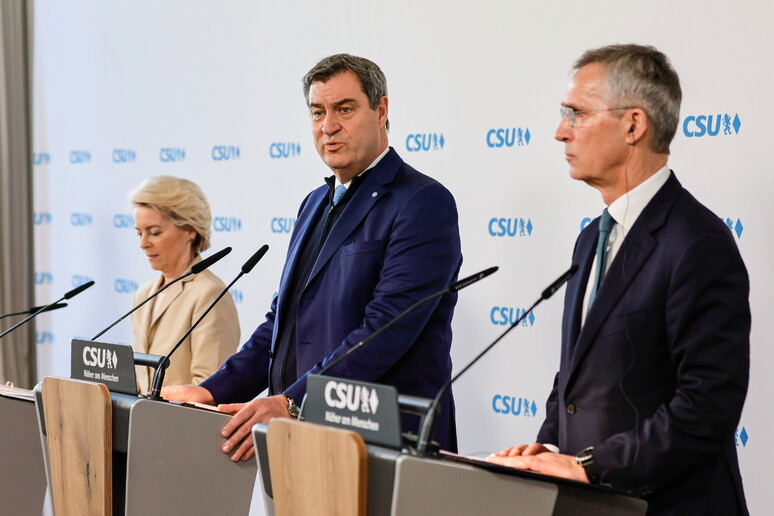With Donald Trump's recent NATO
comments igniting a political firestorm among the alliance's
members and further US funding for Ukraine looking set to be
rejected in the Republican-led lower house, European leaders
call for stronger European efforts to ensure the security of the
continent.
Donald Trump, former US President and the presumptive Republican
nominee for the November US election, said at a campaign event
that he would "encourage" Russia "to do whatever the hell they
want" to NATO countries that are not spending enough on defence.
Trump's comments about the US-led military alliance - brash even
by his standards of long-term NATO-bashing - drew alarm from
allies and fierce condemnation from the White House with US
President Joe Biden condemning the comments as "dumb" and
"shameful".
NATO chief Jens Stoltenberg warned that "any suggestion that
allies will not defend each other undermines all of our
security, including that of the US". EU foreign policy chief
Josep Borrell said that "NATO cannot be an à la carte military
alliance", adding that it was either existing or not existing.
Spanish Minister of Defence Margarita Robles said that the
alliance "will not accept any act that could involve a violation
of the minimum rights included in international law and in the
UN Charter of Rights".
Diplomats from multiple NATO countries insist that keeping the
United States on board remains fundamental to deterring the
threat from Russia. But they remain sanguine about how genuine
Trump's threats are, arguing the alliance emerged from his first
term unscathed.
"Unprecedented rise" in defence spending, doubts over future US
aid for Ukraine
Stoltenberg said on Wednesday that 18 of the alliance's 31
countries are set to hit their defence spending target this
year. Spurred on by Russia's all-out invasion of Ukraine in
2022, last year saw an "unprecedented rise" of 11 percent in
spending by European members and Canada, the NATO chief added.
Overall, he said European allies and Canada will have added more
than $600 billion to their defence spending since they set the
two-percent goal of their GDP a decade ago. The United States
still accounts for the vast bulk of combined defence spending by
NATO members.
"We should leave no room for miscalculation or misunderstanding
in Moscow about our readiness and our commitment, our resolve to
protect allies," Stoltenberg said.
NATO Deputy Secretary General Mircea Geoană stated in early
February: "We will continue to support Ukraine. This is not the
time to become pessimistic about what will happen in this war,
which will be two years old in a few days. We have the
resources, we have the will to make Ukraine succeed. It is very
important that we remain united and continue to support this
country, because their fight is our fight, their security also
protects our security."
Moscow's full-scale war on Ukraine has served as a wake-up call
for European countries and saw NATO turn the two-percent figure
into a minimum requirement rather than a goal. Key players such
as Germany have ramped up their spending and are set to meet the
target this year. Spain aims to reach two percent by 2029.
Spanish Minister of Defence Robles said the government was
making an "extremely important effort" in terms of defence
investment, adding that the 2023 budget was "a very high
increase" in comparison to the year before.
Celebrating its 20th NATO membership anniversary this year,
Slovenia's defence expenditure is estimated to reach 1.31
percent of its GDP. The country plans to raise defence spending
to two percent by 2030. The modernisation of the Slovenian Armed
Forces gained momentum in recent years but investment plans were
impacted by the catastrophic floods last year.
On Thursday, Stoltenberg said he was welcoming the uptake in
defence investments by the European allies but also that this
was not an alternative to NATO but a way to strengthen it. The
NATO chief underlined that the strength was to have Europe and
North America in NATO together.
While there is a focus on NATO's own defence spending, the
pressing issue of support for Ukraine was also on the table at
the meeting on Wednesday.
The US Senate a day before approved long-delayed funding for
Ukraine's war effort, but the package looks set to be rejected
by the Republican-led lower house. Doubts over the future of US
aid come as Ukraine says its forces are being outgunned in the
face of a slow-moving Russian advance along the front line.
ALL RIGHTS RESERVED © Copyright ANSA











